Search titles
Displaying results 501 to 510 of 607.

Whistleblowing in the Australian Public Sector »
Enhancing the theory and practice of internal witness management in public sector organisations
Edited by: A. J. Brown
Publication date: September 2008
Of the many challenges in public sector management, few are as complex as the management of whistleblowing. Because it can lead to the discovery and rectification of wrongdoing, public interest whistleblowing is widely acknowledged as being positive for organisations and for society at large. However, the conflicts and reprisal risks often associated with whistleblowing also support a widespread belief that every whistleblower is destined to suffer, and nothing can be done to protect them from reprisals. Even if they did it once, sensible employees are often seen as unlikely to ever blow the whistle a second time around.
The extensive research in this book reveals a more complex and, fortunately, more positive picture. The product of one of the world’s most comprehensive research projects on whistleblowing, evidence from over 8,000 public servants in over 100 federal, state and local government agencies shows that whistleblowers can and do survive, and that often their role is highly valued. Public sector managers face significant challenges in better managing and protecting whistleblowers. There is great variation between the many public agencies making the effort, and the many agencies where the outcomes — for managers and whistleblowers alike — are still likely to be grim. This book is compulsory reading for all public sector managers who wish to turn this negative trend around, and for anyone interested in public accountability generally.
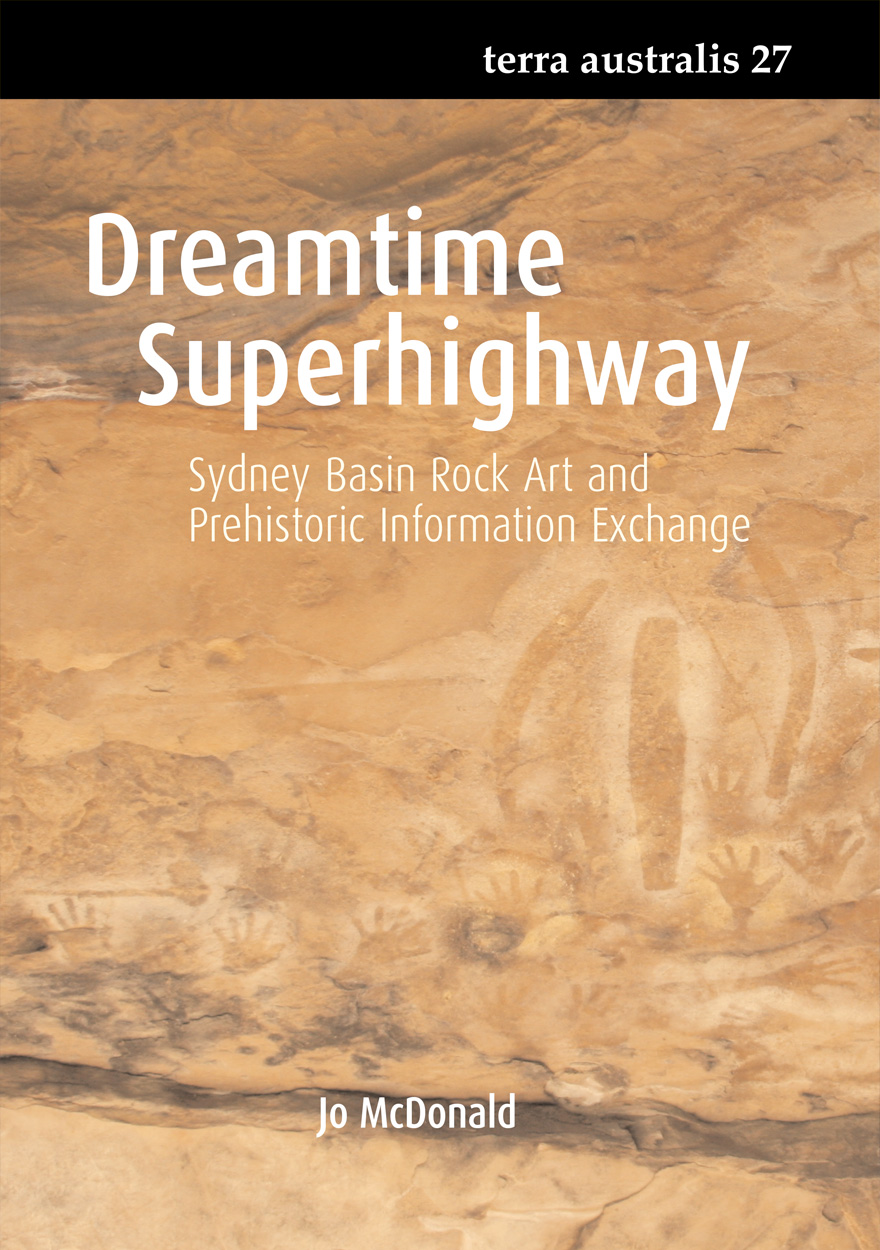
Dreamtime Superhighway »
Sydney Basin Rock Art and Prehistoric Information Exchange
Authored by: Jo McDonald
Publication date: August 2008
Dreamtime Superhighway presents a thorough and original contextualization of the rock art and archaeology of the Sydney Basin. By combining excavation results with rock art analysis it demonstrates that a true archaeology of rock art can provide insights into rock art image-making in people’s social and cultural lives. Based on a PhD dissertation, this monograph is a significantly revised and updated study which draws forcefully on rich and new data from extensive recent research—much of it by McDonald herself. McDonald has developed a model that suggests that visual culture—such as rock artmaking and its images and forms—could be understood as a system of communication, as a way of signaling group identifying behaviour. For the archaeologist of art, the anthropologist of art and those of us who try to think about past worlds… this monograph is a must read.
Margaret W. Conkey
University of California, Berkeley
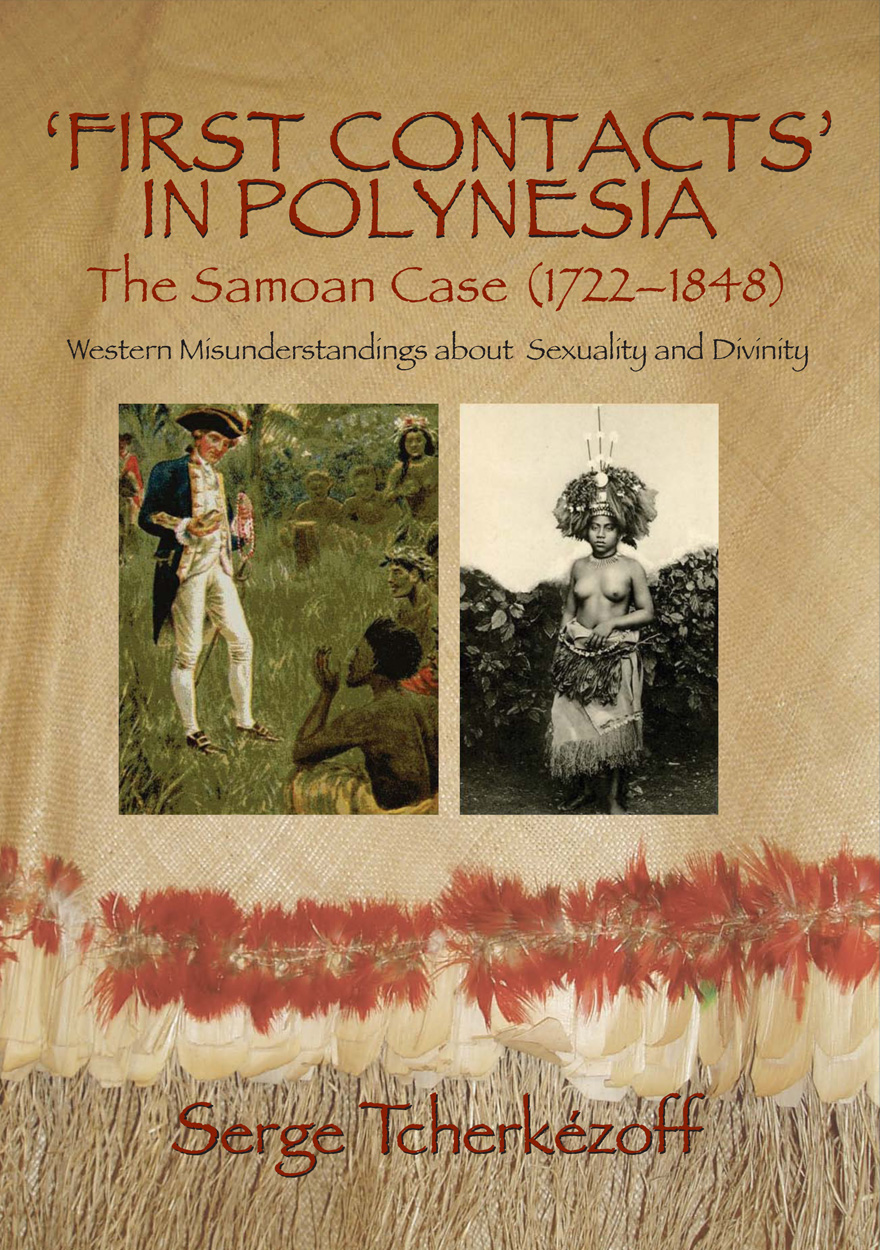
First Contacts in Polynesia »
The Samoan Case (1722–1848) Western Misunderstandings about Sexuality and Divinity
Authored by: Serge Tcherkézoff
Publication date: August 2008
This book explores the first encounters between Samoans and Europeans up to the arrival of the missionaries, using all available sources for the years 1722 to the 1830s, paying special attention to the first encounter on land with the Lapérouse expedition. Many of the sources used are French, and some of difficult accessibility, and thus they have not previously been thoroughly examined by historians. Adding some Polynesian comparisons from beyond Samoa, and reconsidering the so-called ‘Sahlins-Obeyesekere debate’ about the fate of Captain Cook, ‘First Contacts’ in Polynesia advances a hypothesis about the contemporary interpretations made by the Polynesians of the nature of the Europeans, and about the actions that the Polynesians devised for this encounter: wrapping Europeans up in ‘cloth’ and presenting ‘young girls’ for ‘sexual contact’. It also discusses how we can go back two centuries and attempt to reconstitute, even if only partially, the point of view of those who had to discover for themselves these Europeans whom they call ‘Papalagi’. The book also contributes an additional dimension to the much-touted ‘Mead-Freeman debate’ which bears on the rules and values regulating adolescent sexuality in ‘Samoan culture’. Scholars have long considered the pre-missionary times as a period in which freedom in sexuality for adolescents predominated. It appears now that this erroneous view emerged from a deep misinterpretation of Lapérouse’s and Dumont d’Urville’s narratives.
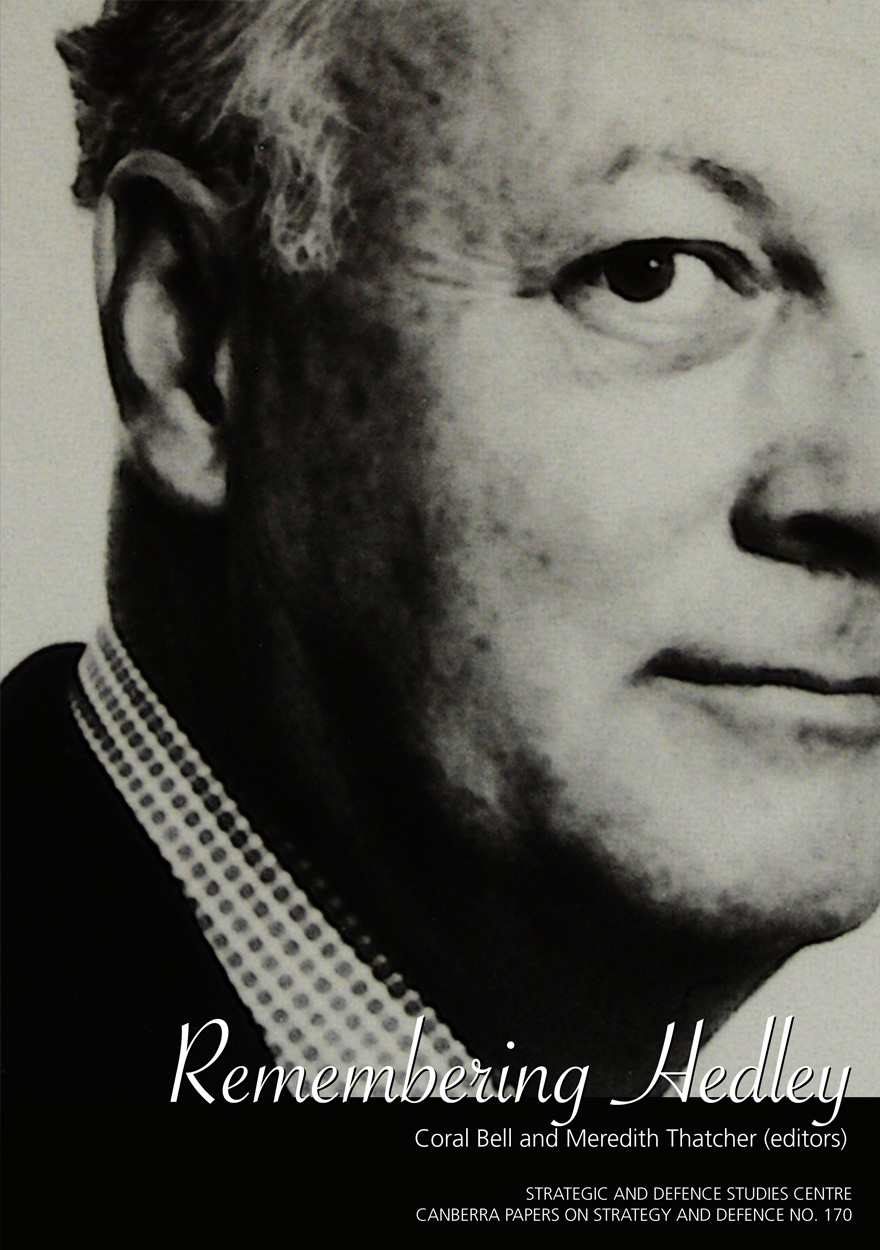
Remembering Hedley »
Edited by: Coral Bell, Meredith Thatcher
Publication date: August 2008
Remembering Hedley commemorates the life of Hedley Bull (1932–85), a pivotal figure in the fields of international relations and strategic studies. Its publication coincides with the official opening on 6 August 2008 of the Hedley Bull Centre at The Australian National University in Canberra.
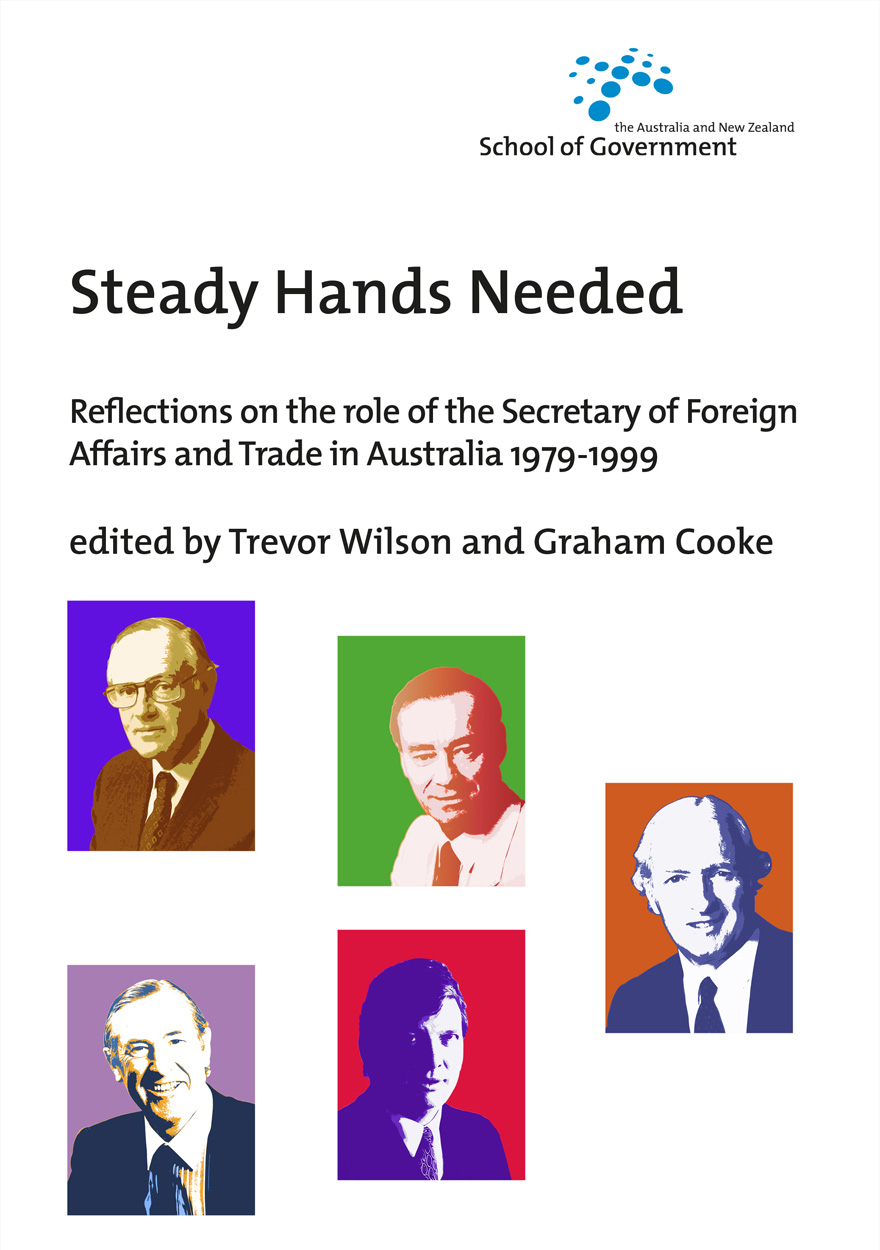
Steady Hands Needed »
Reflections on the role of the Secretary of Foreign Affairs and Trade in Australia 1979-1999
Edited by: Trevor Wilson, Graham Cooke
Publication date: August 2008
In this monograph, five former secretaries of the Department of Foreign Affairs and Trade (DFAT) reflect on their experiences and the challenges of their times. A far cry from the pukka fantasies of ‘Yes Minister’, their recollections reveal the realpolitik of the policy front line where the secretary must stay ahead of emerging themes and issues in Australia’s international relations while simultaneously exercising governance oversight and providing leadership to a large, professional, diverse and dispersed organisation. From the Cold War to the War on Terror; from the floating of the dollar to GATT and the WTO; managing relations big and small, within our region and without; through relentless administrative reforms, technological change and changes of government; steering DFAT requires ‘steady hands’. This collection of public lectures presented in 2006 to the Australian Institute of International Affairs (AIIA) offers an invaluable resource for those with an interest in recent Australian history, foreign policy and public sector administration.
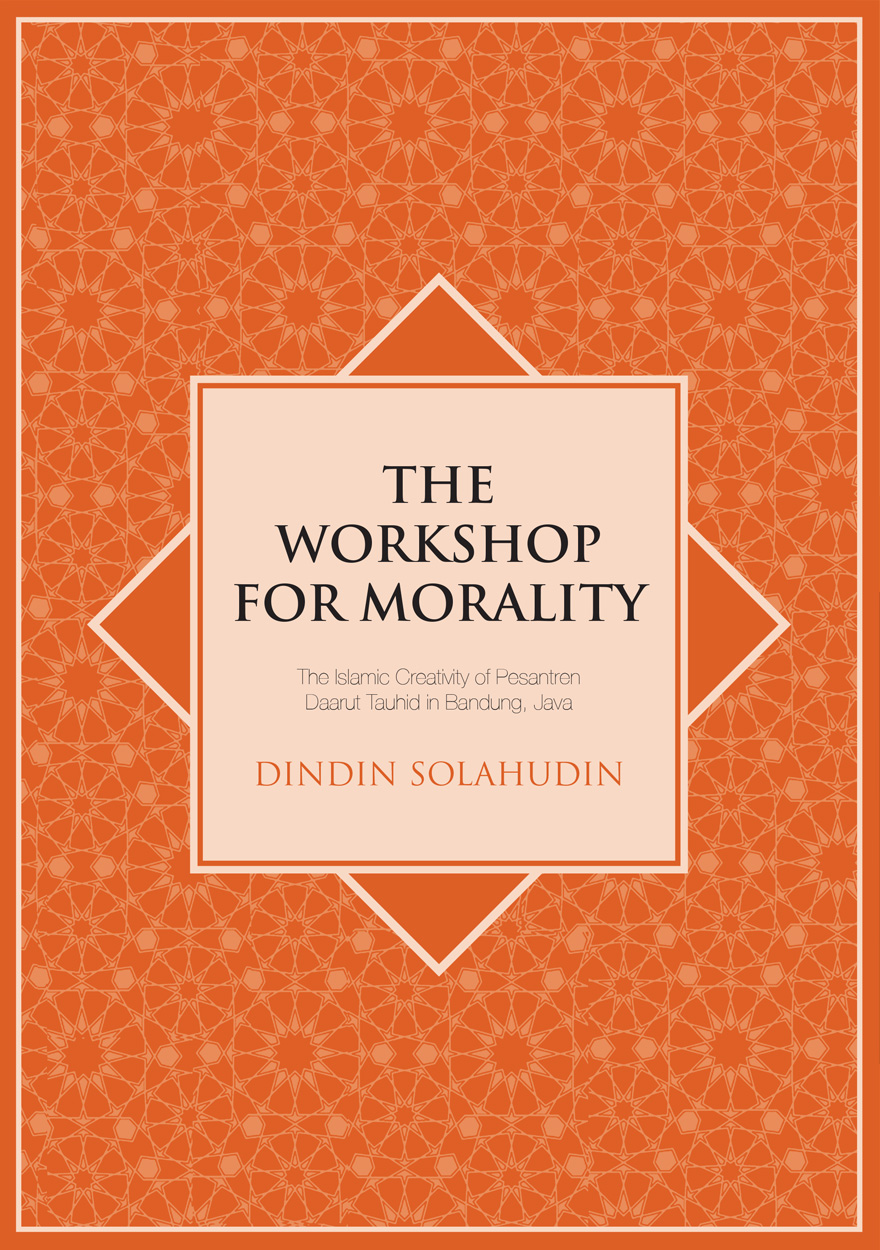
The Workshop for Morality »
The Islamic Creativity of Pesantren Daarut Tauhid in Bandung, Java
Authored by: Dindin Solahudin
Publication date: August 2008
This volume is a remarkable study of a most unusual pesantren. Officially known as Pesantren Daarut Tauhid, this pesantren was located in Bandung and flourished at the beginning of a period of Islamic resurgence in Indonesia. More commonly referred to as the Bengkel Akhlaq, this ‘Workshop for Morality’ exerted a special appeal to groups of young urban Muslims, particularly students. Its founder was H. K. Abdullah Gymnastiar, popularly known as Aa Gym, who later went on to become one of Indonesia’s most important Muslim preachers and television celebrities.
The Workshop for Morality is a superb work of both historical and ethnographic relevance that reflects the capacity of its author, Dindin Solahudin, to capture a critical moment in the development of Islam in contemporary Indonesian society.
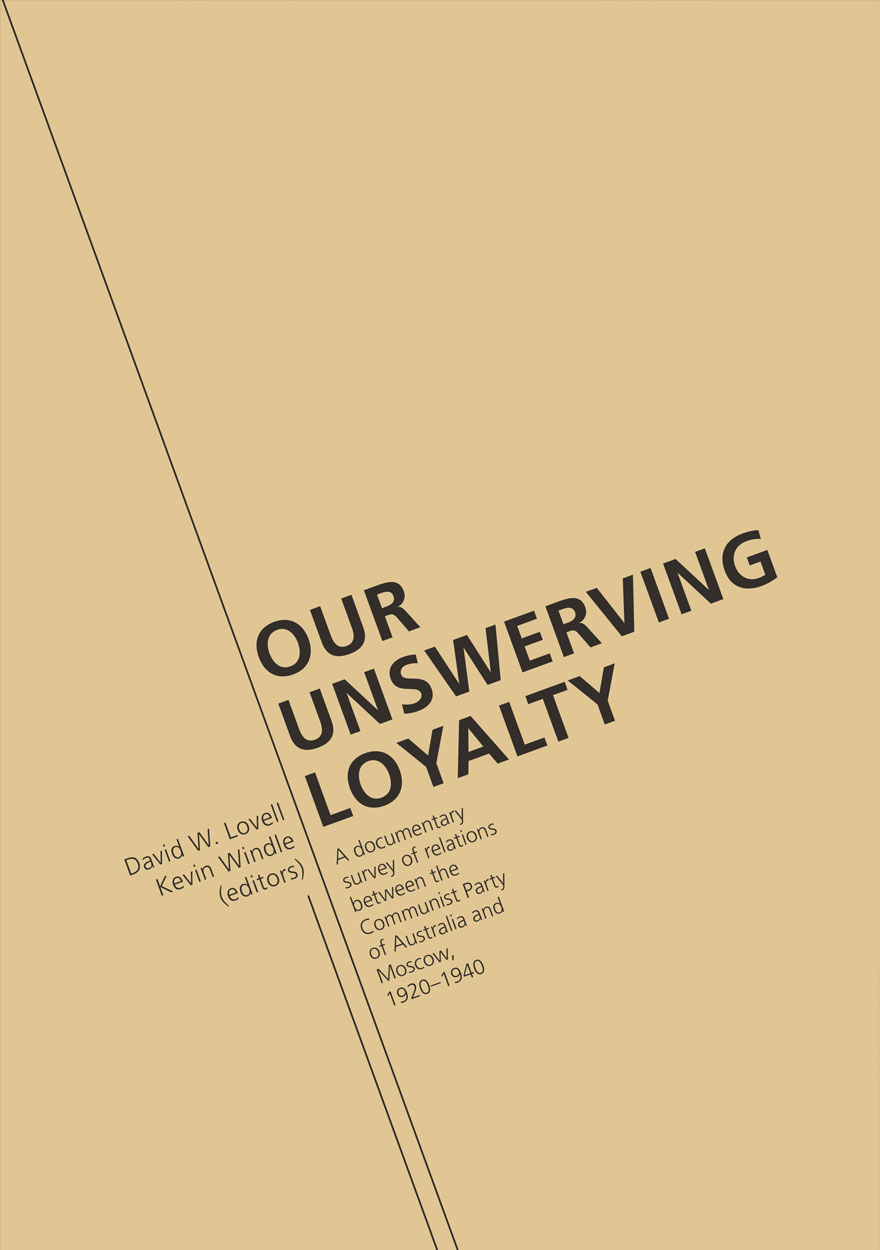
Our Unswerving Loyalty »
A documentary survey of relations between the Communist Party of Australia and Moscow, 1920–1940
Edited by: David W. Lovell, Kevin Windle
Publication date: August 2008
The story of the Communist Party of Australia has been told in various ways. Until now, however, archival collections that have borne on this story have been relatively inaccessible to the ordinary, interested reader. This book begins to redress that deficiency by bringing together 85 key documents from the Russian State Archives of Social and Political History (RGASPI), selected from a collection of thousands of documents concerning the relations between the Communist International and the Communist Party of Australia. The selection focuses on the relationship between the CPA and the Comintern because the activities of the CPA are essentially incomprehensible without understanding the international communist context within which the CPA operated. That context was dominated by the newly-created Soviet state and its decision to authorize and utilize a network of communist parties throughout the world.
The documents in this work suggest three major propositions about the relationship between the CPA and the Comintern. First, that the Comintern was crucial in the formation of the CPA, via its emissaries, instructions and authority. Second, that the Comintern played a major role in directing the policies of the CPA in domestic matters (not to mention in international matters, where the Comintern’s decisions were supreme). And third, that the leadership of the CPA was, from 1929 onwards, shaped, trained and authorized by the Comintern. With access to the documents, readers now have a chance not just to hear the voices of the times, but to make their own judgements about the relationship between the CPA and Moscow.
The book also includes two extended introductory essays that outline the development of the Comintern and its relations with the CPA, as well as supporting materials that provide information on individuals, organizations and tactics mentioned within the documents themselves.
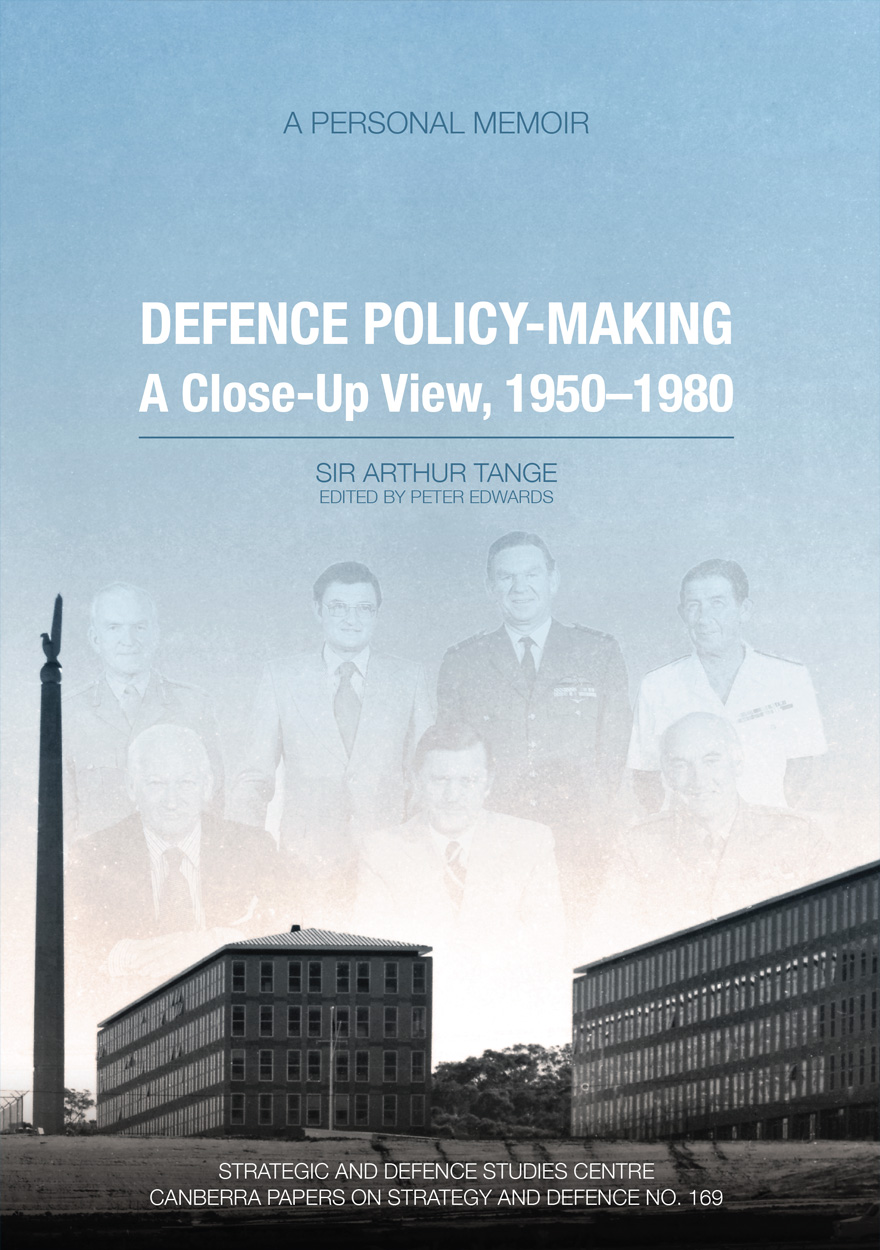
Defence Policy-Making »
A Close-Up View, 1950-1980- A Personal Memoir
Edited by: Peter Edwards
Authored by: Sir Arthur Tange
Publication date: July 2008
Sir Arthur Tange was perhaps the most powerful Secretary of the Australian Defence Department and one of the most powerful of the great ‘mandarins’ who dominated the Commonwealth Public Service between the 1940s and the 1970s. His strong, and often decisive, influence on both administration and policy was exerted by virtue of his intellectual capacity, his administrative ability and the sheer force of his personality.
Controversies from his time in Defence, including those associated with ‘the Tange report’ and ‘the Tange reforms’, echo to this day, and it is still easy to identify both staunch admirers and vitriolic critics in defence and public service circles. Tange wrote this account in his last years. It is a memoir – based largely on memory supplemented by limited reference to documentary material – that focuses upon his career after he came to Defence in 1970. It records his own account of his part in those administrative reforms and policy shifts, as well as his involvement-or non-involvement or alleged involvement-in several of the political crises of the 1970s, including the downfall of John Gorton as Prime Minister and the dismissal of the Whitlam Government.
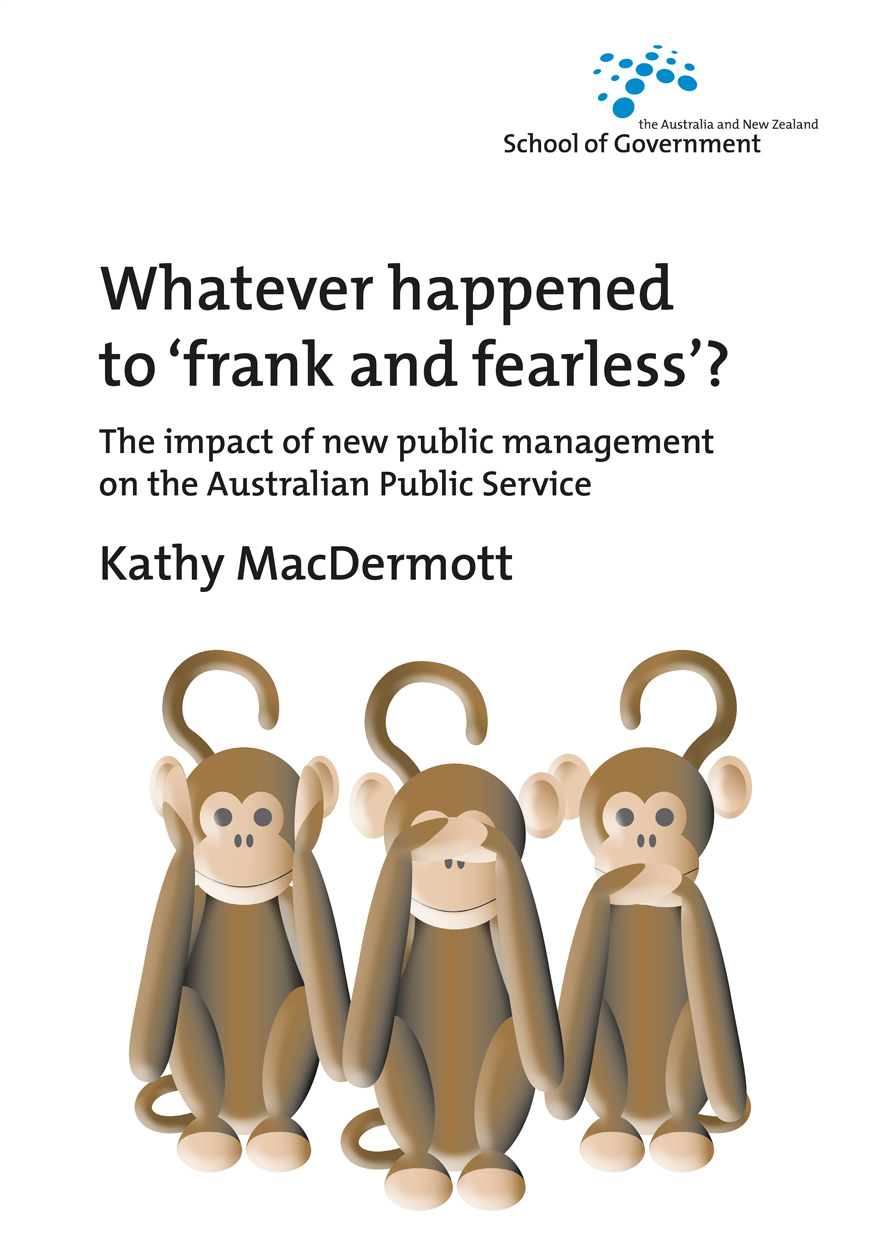
Whatever Happened to Frank and Fearless? »
The impact of new public management on the Australian Public Service
Authored by: Kathy MacDermott
Publication date: July 2008
In this evidence-based and closely argued work, Kathy MacDermott plots the changes in the culture of the Australian Public Service that have led many contemporary commentators to lament the purported loss of traditional public service values of impartiality, intellectual rigour and — most importantly — the willingness of public servants at all levels to offer frank and fearless advice to their superiors and their ministers. MacDermott brings to her analysis an insider’s sensibility and a thorough forensic analysis of the impact of some 20 years of relentless administrative ‘reform’ on the values and behaviour of the APS. Although this story has its beginnings in the Hawke-Keating eras, MacDermott convincingly argues that structural and cultural change compromising the integrity of the public service reached its apogee towards the end of the eleven years of the Howard government. This is a ‘must read’ for students of Australian political and administrative history. MacDermott offers cautionary observations that the new national government might do well to heed.
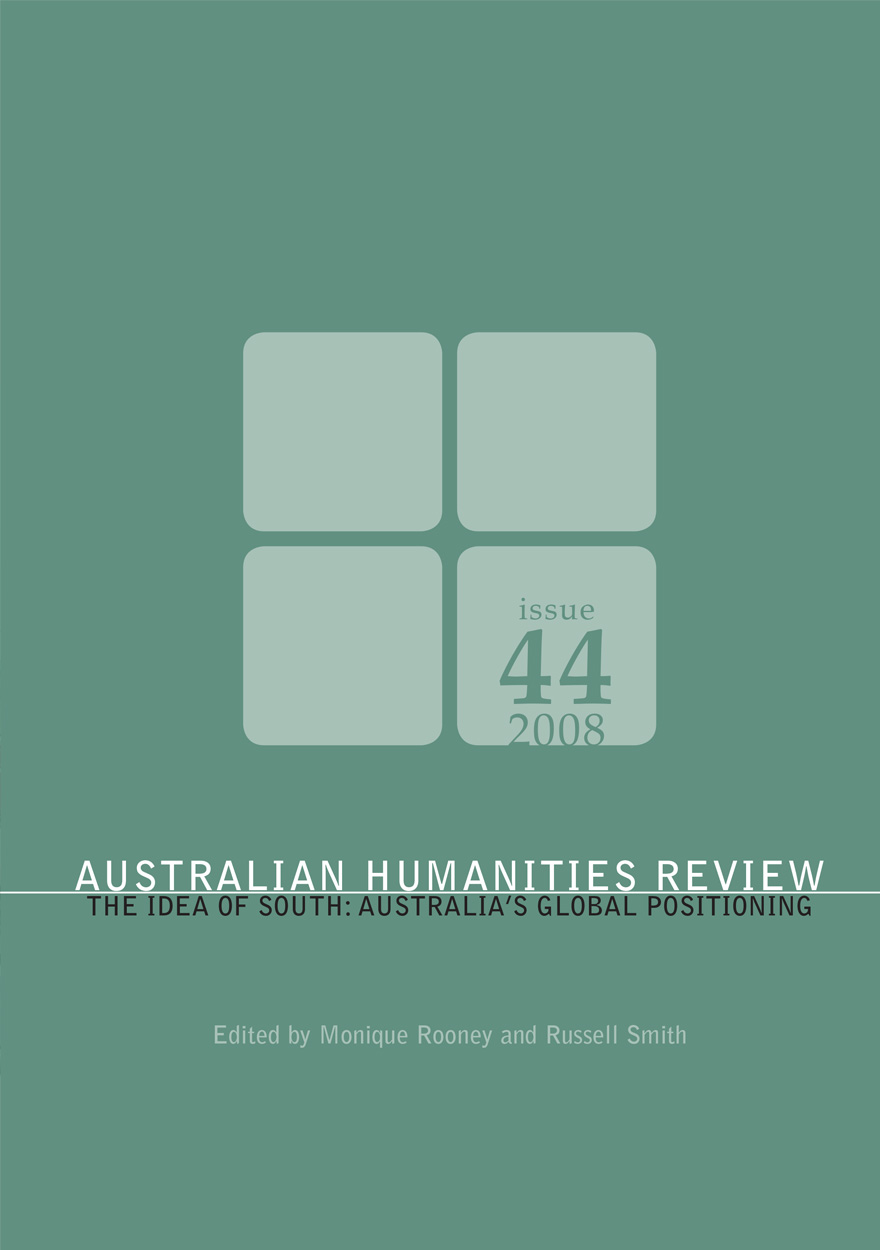
Australian Humanities Review: Issue 44, 2008 »
The idea of South: Australia’s global positioning
Edited by: Monique Rooney, Russell Smith
Publication date: July 2008
Australian Humanities Review is a peer-reviewed interdisciplinary journal featuring articles, essays and reviews focusing on a wide array of topics related to literature, culture, history and politics.
Issue 44 of Australian Humanities Review is dedicated to exploring the idea of ‘the South’ and its role in Australians’ perception of their place in the world. Culturally and politically, Australia is closer to the North than to the southern nations that are its neighbours, while geographically, ecologically and historically it remains part of the South. What are the implications of Australia’s global position? What reorientations of our notions of history, culture and knowledge are required for Australia fully to acknowledge its southern status?
Download for free
Not available for purchase



